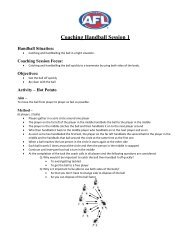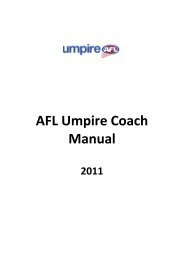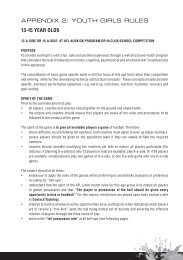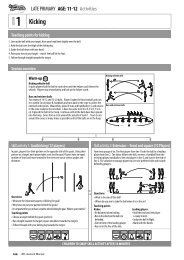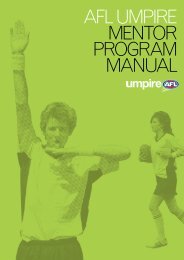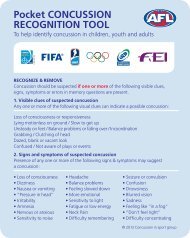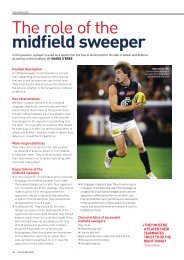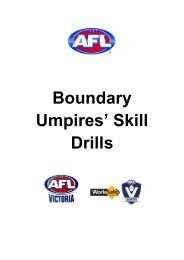Level 1 Umpire Accreditation Manual - AFL Community
Level 1 Umpire Accreditation Manual - AFL Community
Level 1 Umpire Accreditation Manual - AFL Community
You also want an ePaper? Increase the reach of your titles
YUMPU automatically turns print PDFs into web optimized ePapers that Google loves.
Unit 9 – Improving PerformanceImproving umpiring performances is a goal ofmost <strong>Umpire</strong>s regardless of what level they officiate.The responsibility for improving performancesrests with the <strong>Umpire</strong>.<strong>Umpire</strong>s will receive a range of feedback ontheir performances – from players, spectators,club officials and umpiring personnel at mostmatches they <strong>Umpire</strong>.For improvement to occur the <strong>Umpire</strong> will firstlyneed to know the area/s that need improvement.This information can come from umpiringpersonnel – the coach or observer or a senioror more experienced <strong>Umpire</strong>.It is important that the <strong>Umpire</strong> listens to the feedbackthat is provided and to respond in a positive manner.The <strong>Umpire</strong> should thank the person for the feedback.What the <strong>Umpire</strong> does with the feedback is crucialto assisting him to improve his performance.The feedback can provoke some thought/s as towhat might be done in the next match and howhe might do that if he is to improve the pointsraised in the feedback.In discussions with the person providing thefeedback the <strong>Umpire</strong> can come up with a numberof possible actions (not too many) to take away toimplement in the next match.The <strong>Umpire</strong> can use a diary to record their reflections.Umpiring DiaryThe <strong>Umpire</strong> probably has kept a diary at some timein his life. Some common benefits of a diary:• diaries help him remember;• diaries help him gain a perspective on his life;• diaries help us self-reflect;• diaries are individualised and personalised.The <strong>Umpire</strong> should write up his diary entry on thesame day as the match. This means that the gameis still fresh in his mind.Keeping a DiaryKeep it simple and to the pointWrite in note form and use diagrams.Describe before judgingDescribe your performance before evaluatinghow good or bad it was. Be as clear and preciseas possible.Don’t forget what you do wellIt is just as important to be clear about what youdid well as what you need to do to improve.Evaluation demands explanationWhy was your performance good? Why doesit need to be improved? Why would anotherapproach be better?Brainstorm solutionsIf you can see the problem but no clear solution,you can write down a whole lot of ideas, even crazyones, and see if that helps.Try, try againStrategies can go wrong. Improvement can be slow.Don’t be afraid to return to the same behaviour anumber of times.ASSESSMENTYou will need to demonstrateactions which contribute toimproving your performance,such as:• Recording aspects of your umpiring performances in your diary;• Discussing diary entries with a coach/mentor;• Receiving and responding to feedback from others;• Discussing the process/es for developing umpiring knowledge,skills and attitudes.22 level one umpires manual



